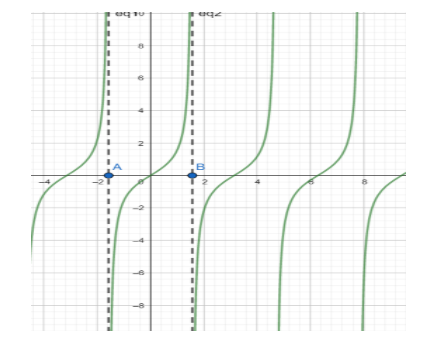Question
Question: Prove that \( \tan \left( {{\tan }^{-1}}x \right)=x,x\in \mathbb{R} \)...
Prove that tan(tan−1x)=x,x∈R
Solution
Hint : Use the fact that if y=tan−1x , then x=tany . Assume y=tan−1x . Write tan(tan−1x) in terms of y and hence prove the above result.
Complete step-by-step answer :
Before dwelling into the proof of the above question, we must understand how tan−1x is defined even when tanx is not one-one.
We know that tanx is a periodic function.
Let us draw the graph of tanx

As is evident from the graph tanx is a repeated chunk of the graph of tanx within the interval (A, B) and it attains all its possible values in the interval (A, B)
Hence if we consider tanx in the interval [A, B], we will lose no value attained by tanx, and at the same time, tanx will be one-one and onto.
Hence tan−1x is defined over the Domain R , with codomain (2−π,2π) as in the Domain (2−π,2π) , tanx is one-one and Range(tanx)=R .
Now since tan−1x is the inverse of tanx it satisfies the fact that if y=tan−1x , then tany=x .
So let y=tan−1x
Hence we have tany = x.
Now tan(tan−1x)=tany
Hence we have tan(tan−1x)=x .
Also as x is the Domain of tan−1x , we have x∈R .
Hence tan(tan−1x)=x,x∈R
Note : [1] The above-specified codomain for arctanx is called principal branch for tan−1x . We can select any branch as long as tanx is one-one and onto and Range =R . Like instead of (−2π,2π) , we can select the interval (2π,23π) . The proof will remain the same as above.
